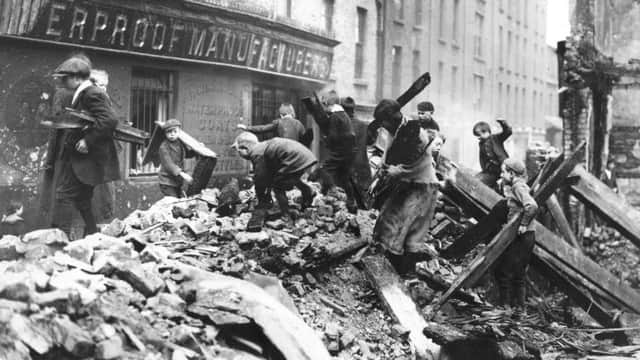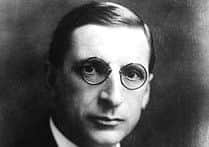Revealed: Coleraine barrister who prosecuted the Easter Rising rebels


In the days following Easter Week 1916, barrister William Evelyn Wylie, a former Coleraine Inst schoolboy, helped to prosecute 160 rebels for their role in the insurrection.
Born in 1881, the son of the Terrace Row Presbyterian clergyman Robert Beatty Wylie and his wife Marion, Wylie lived with his parents and his sister Ida at No 3 Waterford Terrace, Coleraine, according to the 1901 census.
Advertisement
Hide AdAdvertisement
Hide AdHe went to Coleraine Academical Institution before enrolling in the Law School at Trinity College, where he was an outstanding student, winning many academic prizes and was called to the Bar in 1905, becoming a King’s Counsel in 1914.


From 1915 to 1918 he was a lieutenant in the Territorial Army, serving with the Trinity College Officer Training Corps in Dublin, where he took part in the defence of the university and its environs during the 1916 Dublin rising. He was subsequently appointed prosecuting officer at the trial of the leaders of the rising.
He was a keen cyclist, a fact noted by a passage in Ulysses which describes a Bloomsday cycle race between Wylie and his fellow law students.
As a barrister he worked mainly on the northwestern circuit where he achieved considerable success. His friend and fellow barrister Tony Babbington later recalled that “he was a great opponent, very clear-headed and quick off the mark”.
Advertisement
Hide AdAdvertisement
Hide AdAfter Easter Week, the young king’s counsel was given the task of prosecuting the dozens of rebels who had been selected for trial.


General John Maxwell, who had been appointed military commander of Ireland during the Rising, had ordered that trials would take the form of field general courts martial. Proceedings would be held behind closed doors and prisoners would not be entitled to legal representation.
Aspects of the trials would later be found to be illegal but at the time, they were deemed absolutely necessary. The idea was to convict and shoot enough rebels to send a strong message to the general population. History would show that it was a startling miscalculation on Maxwell’s part.
The Irish public were shocked by the events of Easter 1916. Initially hostile to the rebels cause, they were quickly appalled by the British response, when a series of hastily convened and secret courts-martial led to a string of executions. Agonisingly drawn out over two weeks, one observer described it as “like watching a stream of blood seeping from under a closed door”.
Advertisement
Hide AdAdvertisement
Hide AdDespite being the head prosecutor, Wylie recognised the deficiencies of the proceedings. He frequently attempted to help the rebels in their defence; military history interviews show that several of them remembered him in positive terms decades later.
It was in these circumstances that Wylie came across William Corrigan, a Dublin solicitor, who, before the chaos, was a colleague and friend as he was waiting for his turn in the dock.
Before the Rising, Corrigan had briefed Wylie in several cases but the dynamic was now very different. “My God, Corrigan, what are you doing here?” Wylie exclaimed when he recognised the bloodied head of his former instructing solicitor.
Corrigan replied that he was next to be tried and asked if he had any chance. Wylie responded that the previous three defendants had been sentenced to death but that he would do his best for his colleague.
Advertisement
Hide AdAdvertisement
Hide AdAs Seán Enright writes in 1916: The Trials, Wylie ended up prosecuting the case. Despite this, he gave an impassioned speech in favour of his friend and also examined Corrigan in his own defence.
Corrigan was sentenced to death with a recommendation to mercy. His sentence was commuted to five years of penal servitude. He was sent to a prison in England but, before departing, he told his brother Michael to see Wylie to thank him for saving his life.
Prof Robert Schmuhl also referrred to Wylie’s involvement in the mystery surrounding De Valera’s last-minute reprieve - which even fascinated American president, John F Kennedy when he visited Ireland in 1963.
In the book WE Wylie and the Irish Revolution 1916-1921, León Ó Broin draws on Wylie’s unpublished memoir about his service as a second lieutenant in the Territorial Army and as a barrister who witnessed many of the court-martial proceedings after the Rising.
Advertisement
Hide AdAdvertisement
Hide AdOn May 8, 1916, according to Wylie, the commander of the British forces, General Sir John Maxwell, showed him a telegram from H H Asquith, saying the British prime minister wanted the executions to end.
According to Ó Broin: “Maxwell asked Wylie who was next on his list for court-martial, no doubt wondering whether there was anyone on it likely to be executed.”
“Somebody called de Valera, sir.”
“Who is he?” said Maxwell. “I haven’t heard of him before.”
“He was in command of Boland’s bakery in the Ringsend area.”
“I wonder would he be likely to make trouble in the future?” Maxwell went on.
Advertisement
Hide AdAdvertisement
Hide Ad“I wouldn’t think so, sir, I don’t think he is important enough. From all I can hear, he is not one of the leaders.”
“All right then,” said the Commander-in-Chief.
Wylie went on to acknowledge that he “was far off the mark” in judging whether de Valera might cause “trouble in the future”.
An examination of Asquith’s papers at Oxford University supports De Valera’s basic premise that the lateness of his court-martial proved decisive to his commutation.
De Valera was more definite: “I have not the slightest doubt that my reprieve in 1916 was due to the fact that my court-martial and sentence came late.”
Advertisement
Hide AdAdvertisement
Hide AdAfter serving in the offices of the Adjutant-General and the Attorney-General of Ireland, Wylie became Law Adviser to the Irish Government, 1919-1920.
He personally warned prime minister Lloyd George against introducing martial law in Ireland, as had been done with disastrous consequences in 1916.
He was appointed a Judge of the Supreme Court of Judicature of Ireland in 1920 and of the High Court of the Irish Free State in 1924, serving as a Judicial Commissioner to the Irish Land Commission until his retirement in 1936.
He also devoted time in the early 1920s to devising rules for sport horse jumping competitions and was prominent in the creation of an international equestrian competitions body and securing a place within it for the new Irish state. The Wylie Gate entrance from Simmonscourt Road is named for him.
Advertisement
Hide AdAdvertisement
Hide AdWhen Wylie died in Dublin aged 83 in 1964 The Irish Times reported: “He will be chiefly remembered for his lifelong interest in the affairs of the Royal Dublin Society.
“In the years when he gave the commentary on the horse-jumping events at Ballsbridge, his voice, with its crisp northern accent, was familiar to thousands of visitors.”